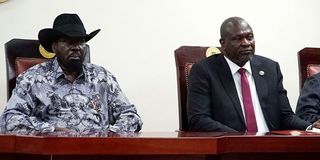Happening Now: Live blog: Kenyans decide in 24 mini-polls
Prime
South Sudan postpones planned elections until 2026

South Sudanese President Salva Kiir and opposition leader Riek Machar.
South Sudan's parties to the 2018 peace agreement have extended the transition period by a further two years, delaying the country's first anticipated democratic elections, which had been scheduled for December this year.
In a meeting at the presidential palace on Friday, the five vice presidents, along with cabinet ministers and advisers, agreed to extend the transition period, pushing elections back to 2026.
Under the revitalised 2018 peace deal, the government reshuffle was due to take place on September 22 this year, with elections originally scheduled to begin in mid-December.
But speaking to reporters, Tut Gatluak, the presidential adviser on national security, described the extension as an opportunity to implement the remaining key protocols of the Revitalised Agreement on the Resolution of the Conflict in South Sudan (R-ARCSS), as the deal is formally known, including the permanent constitution process, the national census and the registration of political parties.
“The extension is in response to the recommendations from both electoral institutions and the security sector... There is a need for additional time to complete essential tasks before the polls,” said Cabinet Affairs Minister Martin Elia Lomuro.
He reassured the public that the government would remain functional throughout the extended period.
“The government will not be dissolved and will continue to function as usual while the institutions work to finalise their provisions. The presidency also emphasises that the remaining months of the current transitional period will be utilised to mobilise funds, aimed at the effective implementation of the revitalised peace agreement,” Lomuro added.
He added that the extension was crucial to achieving long-term peace and stability in the country.
Public reaction to the extension has been mixed, with many South Sudanese expressing scepticism and describing the move as politically motivated and aimed at maintaining power.
“The shareholders have said we wait for another two years. This country has its owners,” said Makoi Majak.
Daniel Danis added, “I can also bet that in two years, we shall witness another extension unless something drastic happens... Power is sweet even for change agitators.”
Jackson Ochaya called on the ruling party to return the money spent on previous political campaigns and reinvest it in the health sector--a sentiment echoed by another prominent X (formerly Twitter) influencer. “So what will happen to the presidential endorsements, T-shirts, and caps branded with December elections?” asked Zack Mayul.
Another Facebook user, Kuot Kilo Base, vented his frustration: “If you don’t get out of this country, you will grow old without achieving anything. Extension after extension.”
In August 2022, the same peace parties signed a two-year extension of the transitional government, a move that foreign partners warned lacked legitimacy. Today’s extension is the second since the peace deal was signed.
International observers have expressed growing frustration with South Sudan’s political leadership, as the long-running feud between President Salva Kiir and Vice President Riek Machar continues to derail progress towards general elections.
According to Radio Tamazuj, the Troika group of nations—Norway, the United States, and Britain—has made it clear that it will only support a further extension of the transitional period if it includes the Tumaini Initiative.
“The government is under pressure from the Troika because of another extension. US Ambassador Michael Adler informed the leadership two days ago that they could support another extension if it included Tumaini. The Troika wants the Tumaini Initiative to serve as an avenue for another extension, but the government did not accept this idea,” the source said.
“Our argument as the transitional government is that the holdout opposition groups are not part of the Revitalized Government and the 2018 peace agreement. So, they cannot decide on any changes to the 2018 peace deal or further extension,” he concluded.





